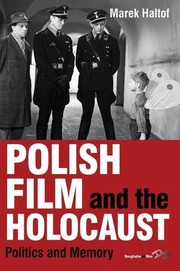- Summary
- During World War II, Poland lost more than six million people, including about three million Polish Jews who perished in the ghettos and extermination camps built by the Nazis in Polish-occupied territories. This book is the first to address the representation of the Holocaust in Polish film and does so through a detailed treatment of several films, which the author frames in relation to the political, ideological, and cultural contexts of the times in which they were created. Following the chronological development of Polish Holocaust films, the book begins with two early classics: Wanda Jakubowska's The Last Stage (1948) and Aleksander Ford's Border Street (1949) and next explores the Polish School period, represented by Andrzej Wajda's A Generation (1955) and Andrzej Munk's The Passenger (1963). Then, between 1965 and 1980 there was an organized silenceA" regarding sensitive Polish-Jewish relations resulting in only a few relevant films until the return of democracy in 1989 when an increasing number were made, among them Krzysztof Kieslowski's Decalogue 8 (1988), Andrzej Wajda's Korczak (1990), Jan Jakub Kolski's Keep Away from the Window (2002), and Roman Polanski's The Pianist (2002). An important contribution to film studies, this book has wider relevance in addressing theissue of Poland's national memory.
- Format
- Book
- Author/Creator
- Haltof, Marek.
- Published
- New York : Berghahn Books, 2012
- Locale
- Poland
- Contents
-
Introduction
Postwar Poland: geopolitics and cinema
Wanda Jakubowska's return to Auschwitz: the last stage
Commemorating the Warsaw Ghetto Uprising in Border Street
Images of the Holocaust during the Polish School period (1955-1965)
Years of organized forgetting (1965-1980)
Return of the repressed: "The poor Poles look at the ghetto" (1981- )
Andrzej Wajda responds: Korczak (1990) and holy week
Documentary archaeology of the Holocaust and Polish-Jewish past
Afterword.
- Notes
-
Includes bibliographical references (pages 250-264), filmography (pages 230-249), and index.
Introduction -- Postwar Poland: geopolitics and cinema -- Wanda Jakubowska's return to Auschwitz: the last stage -- Commemorating the Warsaw Ghetto Uprising in Border Street -- Images of the Holocaust during the Polish School period (1955-1965) -- Years of organized forgetting (1965-1980) -- Return of the repressed: "The poor Poles look at the ghetto" (1981- ) -- Andrzej Wajda responds: Korczak (1990) and holy week -- Documentary archaeology of the Holocaust and Polish-Jewish past -- Afterword.




